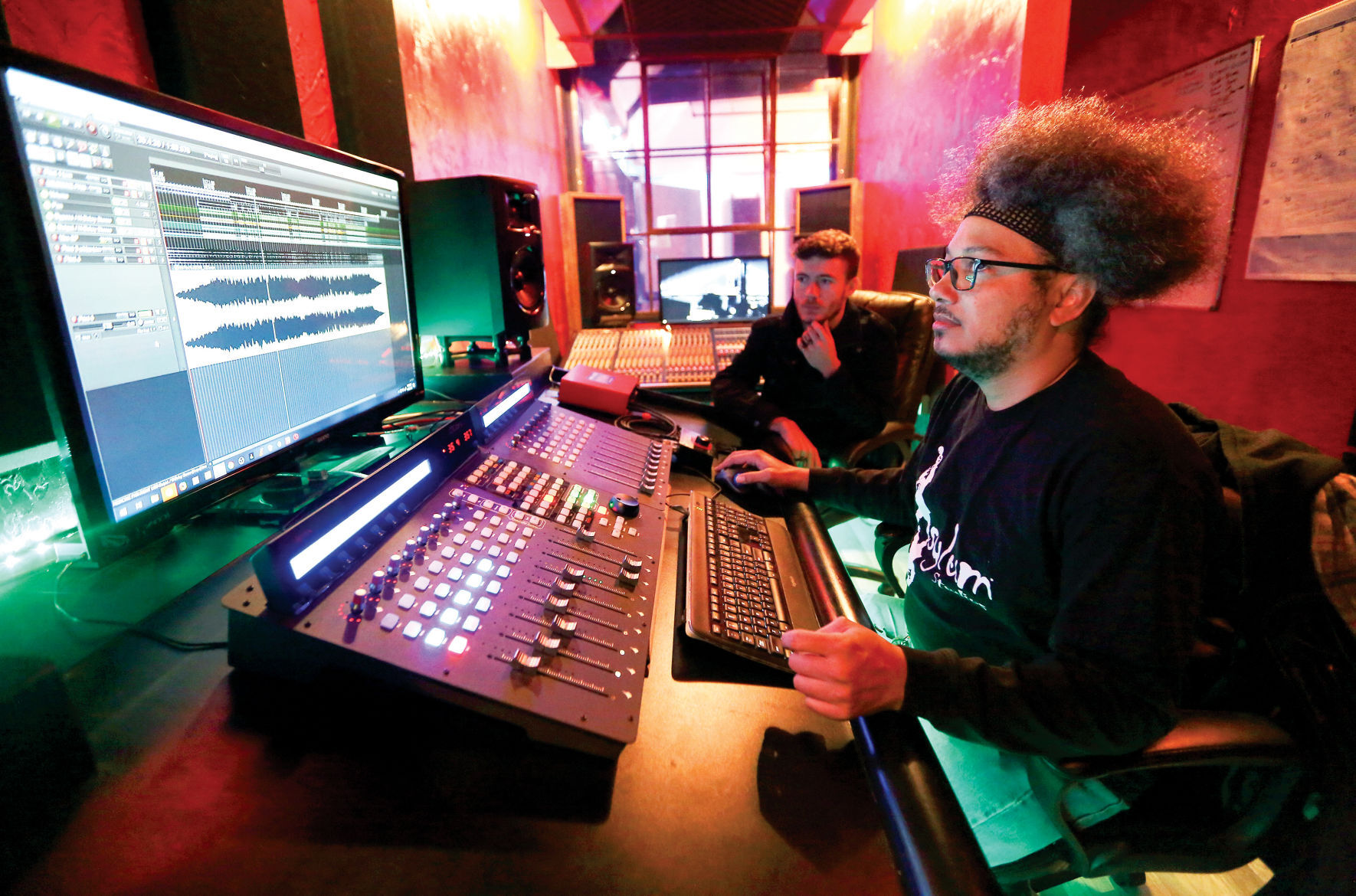When a business is one of a kind in a community, it can stand out. However, for Asylum Recording Studios, the distinction of being “professional” in its industry might not be fully apparent. The studio is setting the record straight.
“It’s not a basement operation,” said Ty Bailey, a musician with the A Few Blind Mice group and Asylum client. “A lot of guys think they can do it, but Asylum is the only professional recording studio around.”
Bailey met Asylum’s owner, Matt “Mr. Zills” Gregory, at The Smokestack in Dubuque, after his group played there a couple of years ago. They started talking about sound and recording goals. Bailey was interested in recording a few songs.
He learned Gregory thinks big for his clients.
“Others just blow smoke … (Gregory) sat me down and said, ‘what’s your favorite band?’ I can make you sound like that.”
Soon, Bailey signed with Asylum and an entire album was born.
A professional recording studio offers artists the right space, set-up, equipment and expertise for recording and production of music and other sounds. Asylum provides that plus extra services and claims local and national clients.
“We record and produce artists’ music including mixing and mastering, a music label and music distribution,” said Gregory, who also is Asylum’s lead sound engineer. “In addition, my company assists artists with their social media and PR presence.”
Located inside The Smokestack in commercial space, Asylum can interact with music performers that play there. Gregory assesses artists’ recording needs and provides a studio tour. He said Asylum is the only studio around that can manage full band recording in a professional-sized studio.
Asylum’s scope even attracted a national cable channel.
“A cast member from the show ‘Teen Mom: Young & Pregnant’ moved locally, and MTV sought a studio to record narration for a show’s episodes,” Gregory said. “I was the only viable solution in the area, and my company was able to provide what they needed.”
A lifelong love of music and sound originally inspired Gregory to start the business.
“I was raised around music. My grandmother, Gladys Beamon, was a world-renowned gospel artist in the ’50s, and she taught me music theory and composition and to play the piano,” Gregory said. “My career started when I began DJing, and I wanted to get into music production and sound engineering.”
Gregory started producing music, which transitioned to helping other artists. He moved to Dubuque in 2013, along with his wife A. Alanda Gregory, and noted there were musicians in the area but no professional recording studio.
So, he opened Asylum.
“After a couple of years of operating the studio in the front of our home with the assistance of a good friend and eventual partner, (we) decided to move the studio to a commercial location,” Gregory said.
In stepped Smokestack owners, Scott Cornwell and Susan Price, who offered unused space to Asylum. Through this partnership, Gregory provides sound engineering for live performances at the club although it is temporarily closed due to the pandemic.
COVID-19 has impacted Asylum and local musicians in this field that relies on in-person contact. However, it also has helped Gregory evolve his services.
Since bands cannot perform as frequently, Gregory added a live streaming service to his repertoire. This helps music groups maintain links to fans and continue offering new music. He is considering offering a regular podcast or vlog.
With 20 years in studio sound engineering and increased word of mouth, Gregory’s career and client list are growing. His industry credentials include being a member of The Recording Academy and an official voting member for the Grammy Awards.
“I am currently working with a young man, Robert McFletcher-Jones, on his debut project, and I have assisted with the recording and production of the band, St. Oshum (formerly known as The Charles Walker Band) from Milwaukee,” Gregory said.
In addition, Asylum founded a record label, EverPlast Music, under which Gregory has produced three original albums for Bailey and A Few Blind Mice.
“COVID has been a real nightmare for musicians and artists,” Bailey said. “But (Gregory) constantly helps reinvigorate our music, booking out months and years at a time. He doesn’t make any promises he can’t keep.”
Asylum has expanded its recording portfolio, working on film scores for indie filmmakers and mixing a song for the movie “Death to Metal,” by Tim Connery, a local director and producer.
“I also engineered the live performance of Dubuque Symphony Orchestra’s production of ‘West Side Story,’” Gregory said. “(And) I was the music director for the 2014 and 2015 Voices of the Warehouse annual art event that was once located in the Millwork District.”
Gregory employs three individuals, including Daniel Young, now a partner, and two interns. All staff provide support for the studio’s recording projects. Gregory has mentored a number of other interns in the field.
Deshawn Brown interned at Asylum for more than a year and recently started Glasshouse Studio primarily for hip hop artists. He credits Gregory for helping with his start in recording work.
“Matt is incredible and does wonderful work.”
During his time at Asylum, Brown did everything from taking out the trash to cleaning and setting up equipment. He said Gregory is precise about all the details of quality recording, and Brown uses the techniques he learned in his work today.
Even with support from interns, Gregory noted one of Asylum’s biggest challenges is to have enough staff to address the number of projects booked.
“Dubuque has many talented musicians, but not enough individuals with the proper knowledge to fully serve their needs,” Gregory said.
He works long hours while continuing to expand a vision for his future efforts in the area.
Gregory is hoping to open a bigger site that could record large-scale acts, including the Dubuque Symphony Orchestra. He plans to continue advancing local partnerships and sharing high standards of being a recording professional.
“I have the ability to try techniques and test new gear thanks to great music partners in this community,” he said. “There are some that may believe that recording studios are what they see in movies and on TV… but once you see the studio, the perception really changes.”




